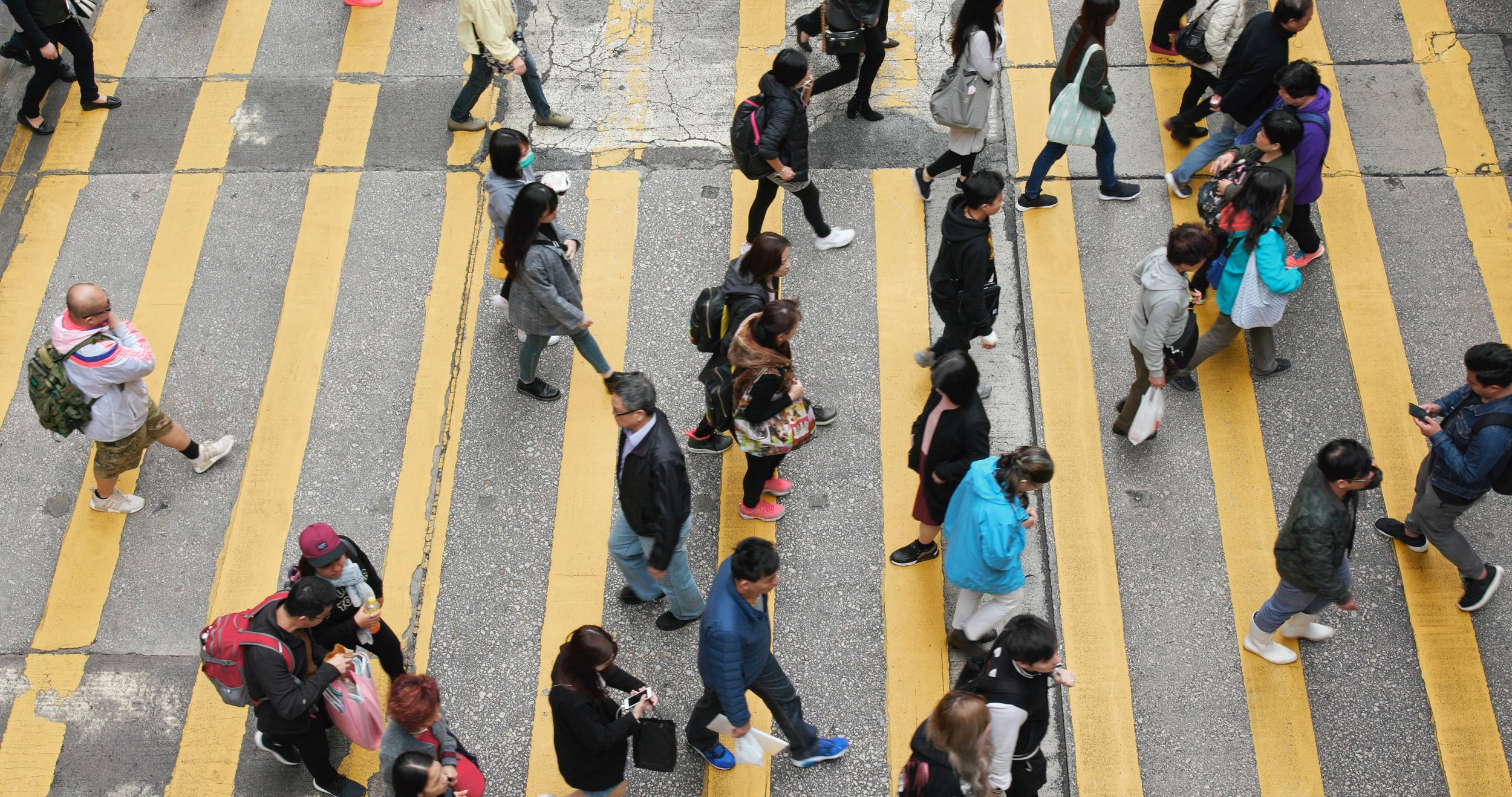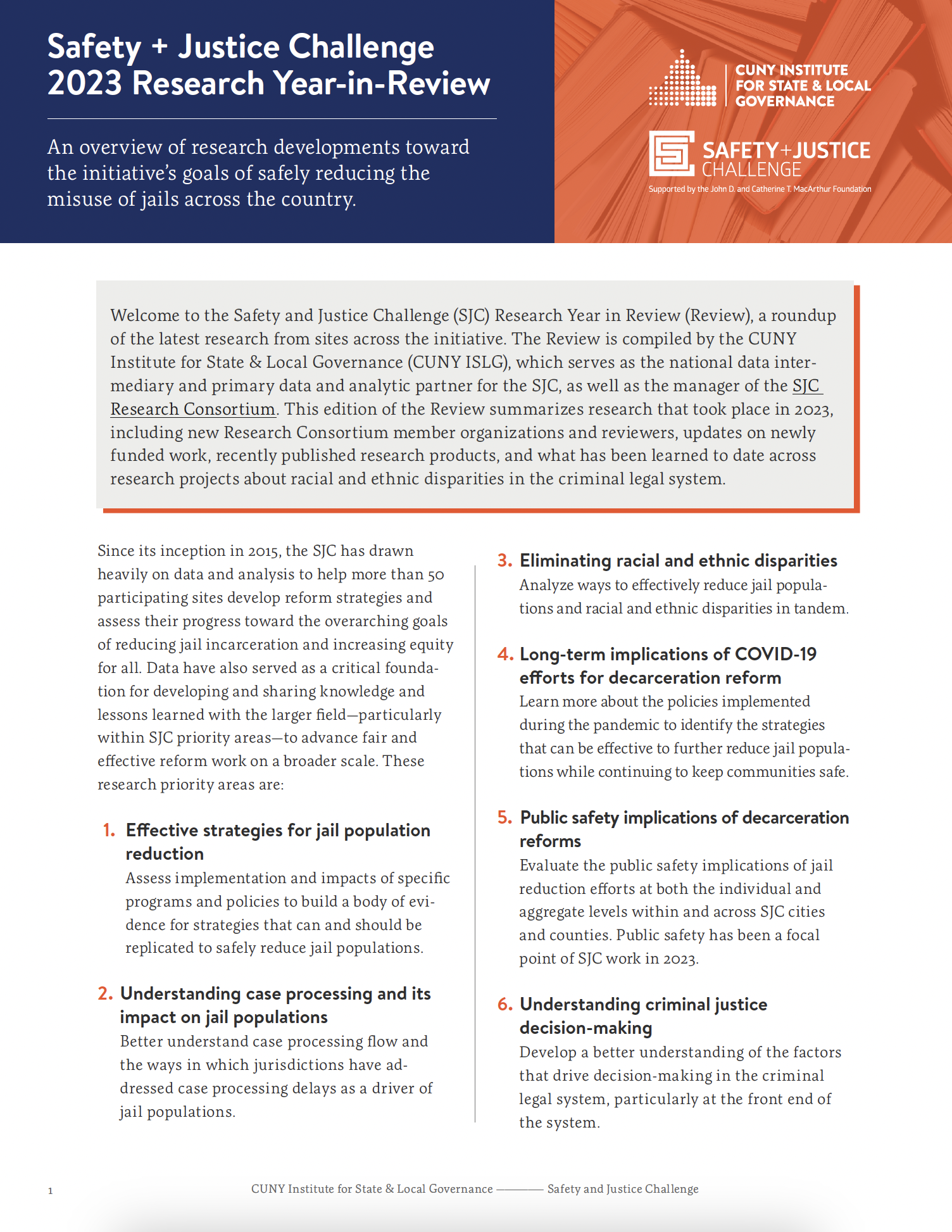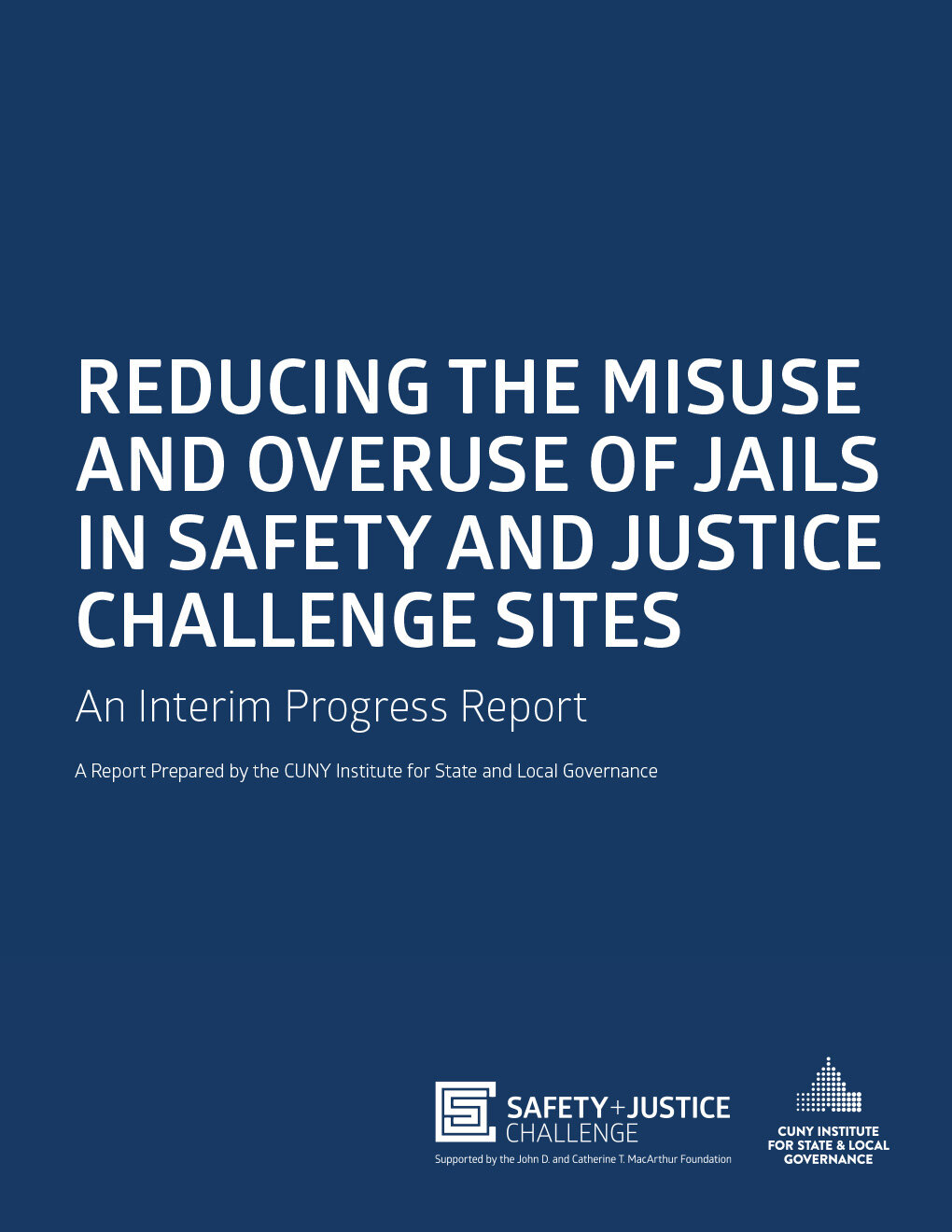
CASE STUDY
Safety and Justice Challenge
LOCATION
Nationwide
ISSUE
Advancing Justice
ACTIVE
2015-present
A national initiative with The MacArthur Foundation to help jurisdictions across the U.S. implement data-informed strategies that will reduce the misuse and overuse of jails and racial and ethnic disparities present across the criminal justice system.
Challenge:
Local jails are often overlooked in conversations about mass incarceration and criminal legal reform. Jails are intended only to hold people serving short sentences—as well as those awaiting court proceedings who are a danger to public safety or a flight risk—but, in reality, their reach extends far beyond. On any given day, more than 650,000 individuals are held in American jails, with more than 7 million admissions per year. About 70 percent of individuals in jail are held pretrial – meaning, are presumed innocent – and many are held on small amounts of bail and/or misdemeanor charges. Further, Black, Latinx, and Indigenous populations, individuals with behavioral health and substance abuse challenges, and those with low incomes are dramatically overrepresented in jails. This comes at a cost to both incarcerated individuals and society: pretrial incarceration is linked with a greater likelihood of conviction and future rearrest, as well as reduced employment, income, and family well-being.
Over-incarceration is so ingrained in the criminal legal system that it can only be addressed through innovative, forward-thinking solutions. Local drivers of over-incarceration must be identified from the ground up—within cities, counties, and states, with a diverse set of community stakeholders—to improve the system as a whole.
Approach:
Seeking to raise national attention to the problem of overuse and misuse of incarceration in local jail systems and to catalyze innovation and reform at the local level, in 2015, the John D. and Catherine T. MacArthur Foundation launched the Safety and Justice Challenge (SJC). Supporting a diverse network of more than 57 cities, counties, and states across the country in developing and implementing decarceration strategies, the SJC represents an ambitious effort to generate transformative change in how localities conceive of and use jail incarceration.
Data, measurement, and evaluation have been pivotal in guiding this initiative—for identifying drivers of the jail population, designing innovative policies and practices monitoring progress, and evaluating and understanding performance. As the national intermediary and primary data and analytic partner, CUNY ISLG plays a leading role in this. The Institute collects systemwide criminal legal data across participating cities and counties to inform this work, and partners with local jurisdictions, external researchers, technical assistance providers, and the MacArthur Foundation to advance the initiative. The rich data that CUNY ISLG collects across SJC sites also provides a unique opportunity to identify effective strategies that can be shared with the larger field. To support the goals of the initiative—and monitor each jurisdiction’s progress toward the goals of reducing incarceration and improving equity—CUNY ISLG undertakes a range of activities, including:
Collecting comprehensive, system-wide criminal legal data from SJC cities and counties annually
Creating and tracking performance metrics, and performing in-depth analysis to understand key outcomes
Providing analytic and data capacity-building assistance to sites to support the development and implementation of robust strategies
Providing strategic guidance and project management toward measurable outcomes
To inform broader reform efforts, in 2019 CUNY ISLG launched a Research Consortium of pre-qualified researchers who carry out rigorous studies to better understand and inform the field of outcomes and impacts of the SJC work, including the effectiveness of various strategies for reducing jail incarceration and racial and ethnic disparities while preserving community safety.
Progress:
Since 2016, CUNY ISLG has been collecting criminal legal data from 25+ SJC cities and counties annually, including case-level criminal legal data from across the system in 15+ jurisdictions. This data collection effort is designed for multiple applications; since it began, CUNY ISLG and other partners have used it for performance measurement and monitoring, data-informed technical assistance, a variety of research and evaluation projects, and more. CUNY ISLG’s data collection activities are described in detail here, and a subset of this data is publicly available through our Measuring Progress tool.
To date, SJC cities and counties have significantly reduced their jail populations, resulting in nearly 18,000 fewer people held in jail on any given day. System involvement of Black, Indigenous, and people of color (BIPOC) has also declined, though not as much as for white people, with disparities persisting. Importantly, CUNY ISLG’s research has demonstrated that jail populations can be reduced safely. To date, the Consortium has supported more than a dozen research projects on topics ranging from understanding the impacts of arrest diversion to unpacking the black box of prosecutorial decisions.
Learn more by visiting the Safety and Justice Challenge site, or contact Reagan Daly, Research Director, at Reagan.Daly@islg.cuny.edu for more information.
Latest Updates




















![[From Our Partners] The Impact of Jail Reduction Strategies on Community Safety](https://images.squarespace-cdn.com/content/v1/5fcea962a1b4d771ad256fcc/d94dfd64-1d7d-4f79-96bb-71f3e77bf49c/Impact+of+Jail+Reduction+Strategies+-+Full.png)


![[From Our Partners] Gatekeeping Justice: the Role of Communications Personnel in Shaping Public Safety](https://images.squarespace-cdn.com/content/v1/5fcea962a1b4d771ad256fcc/988b6282-6619-45a8-8912-98edbf9ac385/Screenshot+2025-11-03+140514.png)
![[From Our Partners] Changing the Initial Appearance Process in Three Sites](https://images.squarespace-cdn.com/content/v1/5fcea962a1b4d771ad256fcc/c1efac4e-4db5-4947-b37e-c8a8f1c77706/Changing+the+Initial+Appearance+Process+-+Findings+from+Three+Sites.png)

![[From Our Partners] Evaluation of Emergency COVID-19 Jail Reduction Strategies in Multnomah County, Oregon](https://images.squarespace-cdn.com/content/v1/5fcea962a1b4d771ad256fcc/d6712efc-29a3-4358-8c48-a511473577a4/exec+summary.png)

![[From Our Partners] Achieving Racial Equity and Improving Culture in Jails Using a Community-Engaged Quality Improvement Process](https://images.squarespace-cdn.com/content/v1/5fcea962a1b4d771ad256fcc/d4cb1e94-8631-4ec2-9826-e131b58d5df7/Full+Report-+Methods+Report+-+Achieving+Racial+Equity+and+Improving+Culture+in+Jails.png)

![[From Our Partners] Redefining Community Safety in Three US Counties](https://images.squarespace-cdn.com/content/v1/5fcea962a1b4d771ad256fcc/3cd6b9b1-8edd-47da-b9f6-2b8f48581788/Redefining+Community+Safety+report+cover.png)
![[From Our Partners] Understanding the Population of People with Frequent Jail Contact](https://images.squarespace-cdn.com/content/v1/5fcea962a1b4d771ad256fcc/f90e61fe-594c-4411-82e3-963f20f3fd07/Cover+of+Recommendations+to+Reduce+Frequent+Jail+Contact+PRA.png)
![[From Our Partners] At the Intersection of Probation and Jail Reduction Efforts](https://images.squarespace-cdn.com/content/v1/5fcea962a1b4d771ad256fcc/9626f8bd-e95a-4ffe-a9ad-0fd7b7330d92/Transitional+Housing+Support+cover.png)
![[From Our Partners] Safety and Justice Challenge Case Studies from the Urban Institute](https://images.squarespace-cdn.com/content/v1/5fcea962a1b4d771ad256fcc/fef83b1d-89ed-40e6-84ba-cb90b4e7a640/Using+Cross-System+Collaborations+fo+Reduce+the+Use+of+Jails+full+cover.png)

![[From Our Partners] Improving Equity and Fairness in Plea Negotiation](https://images.squarespace-cdn.com/content/v1/5fcea962a1b4d771ad256fcc/1669682259950-1MSFE8NNBEW9WK9HS1NL/UMSL+LUC+research+brief+cover.png)

![[From Our Partners] Expanding Supervised Release in New York City: An Evaluation of June 2019 Changes](https://images.squarespace-cdn.com/content/v1/5fcea962a1b4d771ad256fcc/cf844f35-1b81-425f-ab1d-2971b76c5fd2/CCI+SRP+NYC+report+cover.png)
![[From Our Partners] Trends in Jail Incarceration for Probation Violations: Findings from Pima County, Arizona](https://images.squarespace-cdn.com/content/v1/5fcea962a1b4d771ad256fcc/cb642bd2-840d-474f-8671-7342597bfada/Screenshot+%28116%29.jpg)
![[From Our Partners] Evaluations of the Misdemeanor Diversion Program in Durham County, North Carolina](https://images.squarespace-cdn.com/content/v1/5fcea962a1b4d771ad256fcc/1638225590741-AAM28H590TR6Y7V2F8UF/Screenshot+%2832%29.png)



